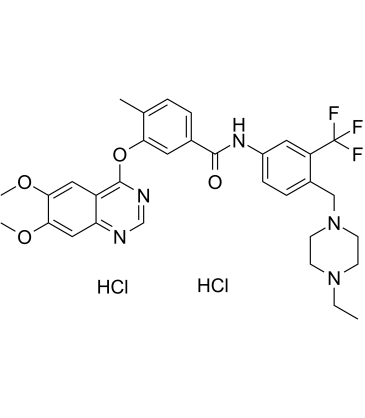TL02-59 dihydrochloride
Modify Date: 2024-01-17 21:22:05

TL02-59 dihydrochloride structure
|
Common Name | TL02-59 dihydrochloride | ||
|---|---|---|---|---|
| CAS Number | 2415263-06-6 | Molecular Weight | 682.56 | |
| Density | N/A | Boiling Point | N/A | |
| Molecular Formula | C32H36Cl2F3N5O4 | Melting Point | N/A | |
| MSDS | N/A | Flash Point | N/A | |
Use of TL02-59 dihydrochlorideTL02-59 dihydrochloride is an orally active, selective Src-family kinase Fgr inhibitor with an IC50 of 0.03 nM. TL02-59 dihydrochloride inhibits Lyn and Hck with IC50s of 0.1 nM and 160 nM, respectively. TL02-59 dihydrochloride potently suppresses acute myelogenous leukemia (AML) cell growth[1]. |
| Name | TL02-59 dihydrochloride |
|---|
| Description | TL02-59 dihydrochloride is an orally active, selective Src-family kinase Fgr inhibitor with an IC50 of 0.03 nM. TL02-59 dihydrochloride inhibits Lyn and Hck with IC50s of 0.1 nM and 160 nM, respectively. TL02-59 dihydrochloride potently suppresses acute myelogenous leukemia (AML) cell growth[1]. |
|---|---|
| Related Catalog | |
| Target |
IC50: 0.03 nM (Fgr), 0.1 nM (Lyn) and 160 nM (Hck)[1] |
| In Vitro | TL02-59 dihydrochloride (0.1-1000 nM; 6 hours) potently inhibits Fgr autophosphorylation in TF-1 cells, with paritial inhibition at 0.1-1 nM and complete inhibition above 10 nM. Hck, Lyn and Flt3 are inhibited in the 100 to 1000 nM range[1]. TL02-59 dihydrochloride inhibits the growth and induced apoptosis of AML cell lines expressing this kinase with single-digit nM potency[1]. TL02-59 dihydrochloride induces growth arrest in primary AML bone marrow samples[1]. Western Blot Analysis[1] Cell Line: TF-1 myeloid cells Concentration: 0.1, 1, 10, 100, 1000 nM Incubation Time: 6 hours Result: Inhibited Fgr autophosphorylation in TF-1 cells. |
| In Vivo | TL02-59 (oral; 1 and 10 mg/kg; for three weeks) completely eliminates AML cells from the spleen and peripheral blood in a mouse model of AML, while dramatically suppressing bone marrow involvement[1]. TL02-59 has a t1/2 of 5.7 h by i.v injection and 6.5 h by p.o. administration, respectively[1]. Animal Model: NOD.Cg-PrkdcscidIl2rgtm1Wjl/SzJ (NSG) mice with human MV4-11 AML cells[1] Dosage: 1 and 10 mg/kg Administration: Oral; for three weeks Result: Eliminated AML cells from the spleen and peripheral blood in a mouse model of AML, while dramatically suppressing bone marrow involvement. |
| References |
| Molecular Formula | C32H36Cl2F3N5O4 |
|---|---|
| Molecular Weight | 682.56 |
| InChIKey | WLZPBFIIZXYWTD-UHFFFAOYSA-N |
| SMILES | CCN1CCN(Cc2ccc(NC(=O)c3ccc(C)c(Oc4ncnc5cc(OC)c(OC)cc45)c3)cc2C(F)(F)F)CC1.Cl.Cl |